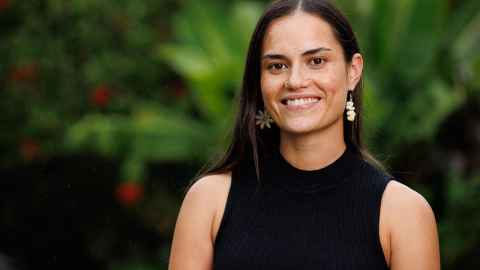'We are more than just climate change,' says proud I-Kiribati academic
07 July 2025
Home nation of Kiribati is focus of doctoral research.

Pacific Studies doctoral candidate and proud I-Kiribati woman Roi Burnett says her home nation is much more than just ‘climate change’.
Aotearoa will celebrate Kiribati Language Week from 6-12 July with the theme 'Maiuakinan te katei ri nanon te tangira ma te ikarinerine bon wantongan te mwenga ibukin te rikirake - Living our valued cultural practices through love and respect upholds our dignity and growth for a successful future'.
Roi carries her great-great-grandmother’s name on her mother’s side and was fortunate to return to the homeland of her ancestors, living for two years on Tarawa, the capital of Kiribati. She hails from the islands of Beru and Onotoa.
“I want people to know we are more than climate change. They might not have heard of us but there’s so much more to Kiribati than just climate change - than us sinking or disappearing.
“We’ve been around for a long time, and we’re going to be around even longer!”
The opportunity to live in Kiribati allowed Roi to spend invaluable time with family while undertaking voluntary roles with non-governmental organisations. The resilience and resourcefulness of the people in Kiribati also made a strong impression during her time there six years ago.
“I lived in Tarawa, and I noticed how resilient and resourceful our people are. There are so many things here that we just take for granted,” she says referring to day to day life in Kiribati.
“My family on Beru live in traditional houses, they fish, and live a subsistence lifestyle.
“Even just things like doing the basics, with my cousins, I was like how do you just weave a basket? Or what do you mean, I have to get my water from the well every day?
“These are the kinds of things you take for granted, the lifestyle of living in New Zealand, although these things are very natural for us.”
We’ve been around for a long time, and we’re going to be around even longer!
Roi was born in Australia, before moving with her family to Fiji and then onto Dunedin where she completed her high school years before attending university. It was the move to Kiribati that inspired her to pursue postgraduate study; she says despite her culture celebrating women it was incongruous with the high statistics around gender-based violence.
“I was working with women’s NGOs in Kiribati, and gender-based violence was a big issue, that was something I was interested in to understand more - especially with a culture that celebrates women.”
“That led me to do my masters, and coming from a geography and politics background, I came across Yvonne Underhill-Sem, which is how I ended up here in Pacific Studies.”
Now a month into her doctoral studies, Roi is realistic about the journey ahead and excited that her area of research will focus on her beloved Kiribati.
Fun facts
Kiribati is the first country to enter the New Year, as coordinated universal time, UTC+14:00 means it is the first place on Earth to experience a new day.
Kiribati has three time zones:
- Gilbert Island Time (including the capital Tarawa) – UTC+12:00
- Phoenix Island Time – UTC+13:00
- Line Islands Time – UTC+14:00 (covers the Line Islands, including Kiritimati/Christmas Island)
Maritime space:
Kiribati has one of the largest Exclusive Economic Zones in the world, around each of its 33 islands, resulting in a maritime area of approximately 3.5 million square kilometres - remarkable given its tiny land footprint of just 811 km².
Kiribati across four hemispheres:
Kiribati is one of the few countries in the world located simultaneously in all four hemispheres - northern, southern, western, and eastern - due to its spread of islands straddling the equator and the 180th meridian.